Ed Miliband used his boldest and most populist speech as Labour leader on Tuesday to announce that he would freeze gas and electricity bills for 20 months if he wins the election, prompting claims by the big six energy firms that such price fixing would lead to California-style energy blackouts and stall investment in new power stations.
In an emblematic policy designed to show he will fight to protect voters' living standards, Miliband told his party's conference in Brighton that he would "reset" the failing energy market. He insisted that the profiteering energy firms could absorb the £4.5bn costs of a freeze. The party cited figures showing consumers had paid £3.9bn over the odds since 2010.
Labour claimed families would save £120 on average and businesses £1,800 during a 20-month freeze due to start immediately after the election in 2015. Miliband said the policy showed Labour, unlike the coalition, had "the strength to stand up to powerful vested interests".
He acknowledged the energy companies would not like the plan, but declared: "The system is broken and we are going to fix it. They have been overcharging people for too long because of a market that doesn't work."
The move would wreck Labour plans to decarbonise the electricity market by 2030, energy firms said. Ofgem, the energy regulator, has the power to approve some temporary price controls, but a senior shadow minister acknowledged the party would have to be braced for a judicial review.
Energy UK, the body representing the largely foreign-owned energy firms, said Labour was sending a signal to the world that the UK was not open for business. It said: "Freezing the bill may be superficially attractive, but it will also freeze the money to build new power stations, freeze the jobs of 600,000 people dependent on energy industry and making the prospect of energy shortages a reality."
Centrica, the energy firm with most UK customers, warned: "If prices were to be controlled against a backdrop of rising costs, it would simply not be economically viable for Centrica or indeed any other energy supplier to continue to operate and far less to meet their sizeable investment challenges the industry is facing."
Ian Peters, head of residential energy at British Gas, meanwhile, told a fringe meeting at the conference: "If we have no ability to control what what we do in retail prices and wholesale prices suddenly go up within a single year that will threaten energy security."The promise to freeze energy prices surprised coalition ministers who believed Miliband would find it impossible to go further than their efforts to force energy bills down. The Tories claimed a two-year freeze would jeopardise the building of renewables for which the energy companies had been required to set aside £9bn.
Labour, clearly seeing parallels with its windfall tax in 1997 on privatised utilities, dismissed the energy firms' complaints saying: "If you are going to lose more than £3bn in excess profits, you are likely to be upset." They added its own polling showed that "the policy is so popular it goes off the richter scale". They also insisted they would not cut the firms any slack if wholesale prices rise, saying they will expose the profiteering by making the wholesale prices they pay more transparent.
In a composed, if lengthy, speech delivered to conference for the second year in succession without notes, Miliband also filled Labour's previously empty-looking policy cupboard: there were promises to introduce the vote to 16-year-olds, cut taxes for small business funded by a slowdown in cuts in corporation tax, and build 200,000 houses in England a year by 2020, including by use of compulsory purchase orders if house builders are hoarding land that has planning permission. He also pledged to abolish the bedroom tax, raise the minimum wage, and improve the offer of free childcare for the parents of three to four-year-olds.
Shadow ministers accepted they had taken the gamble that an electorate, sceptical about politicians' promises, will be in a mood to listen to a political party that is unashamed to use the levers of the state and unsettle business, once the lodestar of New Labour. Miliband's aides also dismissed Tory claims that the speech showed he was reintroducing 1970s-style state intervention, arguing "cutting taxes for small businesses and fixing broken markets hardly represented socialism".
Miliband tried to present the coming election as a contest between hope and fear, repeatedly insisting: "We are Britain. We can do better than this."
He also frequently inverted the Conservatives' warning that Britain is in a global race by saying the Conservatives were in reality conducting a "race to the bottom". He said: "What David Cameron doesn't tell you is that he thinks the only way for Britain to win is for you to lose." Miliband, suffering dire personal polls, said he relished the coming contest with Cameron: "If they want to have a debate about leadership and character – be my guest. Let's have that debate".
He kept referring to "my government" and added: "David Cameron may be strong at standing up to the weak, but he is always weak when it comes to standing up to the strong." He argued: "When it was Murdoch versus the McCanns, he took the side of Murdoch. When it was the tobacco lobby versus cancer charities, he took the side of the tobacco lobby. When it was the millionaires who wanted a tax cut versus people paying the bedroom tax, he took the side of the millionaires". He also took the risk of confronting the kind of election campaign built round immigration likely to be run by Cameron's election guru, Lynton Crosby, by saying "if voters wanted a party that cuts itself off from the rest of the world, then let me say squarely Labour is not your party."
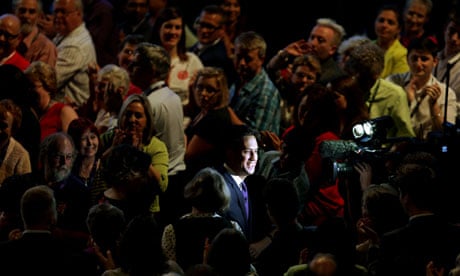
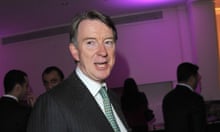



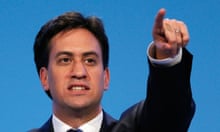
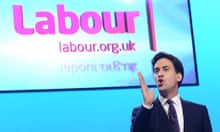

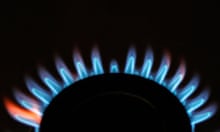

Comments (…)
Sign in or create your Guardian account to join the discussion